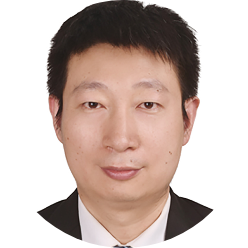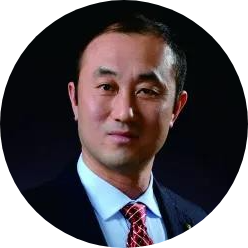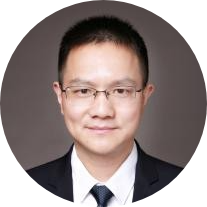Plenary Speakers 2025
Plenary Speaker Ⅰ

Prof. Weidong Zhang
Shanghai Jiao Tong University, China
Brief Biography:
Weidong Zhang received his BS, MS, and PhD degrees from Zhejiang University, China, in 1990, 1993, and 1996, respectively, and then worked as a Postdoctoral Fellow at Shanghai Jiao Tong University. He joined Shanghai Jiao Tong University in 1998 as an Associate Professor and has been a Full Professor since 1999. From 2003 to 2004 he worked at the University of Stuttgart, Germany, as an Alexander von Humboldt Fellow. From 2007 to 2008 he worked at Princeton University, USA, as a Visiting Professor. From 2013 to 2017 he serviced as Deputy Dean of the Department of Automation, Shanghai Jiao Tong University. He serving as a part-time professor at Hainan University from 2021. He is currently Chair Professor of Shanghai Jiao Tong University, Director of the Engineering Research Center of Marine Automation, Shanghai Municipal Education Commission, China. His research interests include control theory, machine learning theory, and their applications in industry and robots. He is the author of more than 300 papers and 2 books. His papers have been cited for more than 23k times in Google, and he has been recognized as Elsevier Most Cited Researcher and Highly Ranked Scholar- Lifetime of ScholarGPS.
Speech Title:
Key Technologies of UAV-USV Cooperation System for Maritime Search and Rescue
Abstract:
The report, set against the backdrop of maritime search and rescue, introduces an unmanned search and rescue system composed of drones and unmanned boats. This system leverages the advantages of drones' wide search range and long communication distance, as well as the long endurance of unmanned boats, to establish an UAV-USV search and rescue system that responds quickly, is cost-effective, and poses no risk of casualties. The report outlines the current development status, discusses key technologies such as landmark recognition, pose control, and cooperative decision-making, and presents the verification process of drone landing technology based on visual navigation in recent years.
Plenary Speaker Ⅱ

Prof. Wenwu Yu
Southeast University, China
Brief Biography:
Wenwu Yu received the B.Sc. degree in information and computing science and M.Sc. degree in applied mathematics from the Department of Mathematics, Southeast University, Nanjing, China, in 2004 and 2007, respectively, and the Ph.D. degree from the Department of Electronic Engineering, City University of Hong Kong, Hong Kong, China, in 2010. Currently, he is the Dean in the School of Mathematics. He is also a Full Professor with the Endowed Chair Honor in Southeast University, China.
Professor Yu is also the Executive Deputy Director of the Jiangsu Provincial Key Laboratory of Networked Collective Intelligence, the Vice Director of the Key Laboratory of Measurement and Control of Complex Systems of Engineering, Ministry of Education of China, the Head of the Information Mathematics Discipline in the Research Center for Mathematical and Physical Fundamentals, Purple Mountain Laboratories, the Executive Director of the Jiangsu National Center of Applied Mathematics in Southeast University, and the Huawei-Southeast University Networked Collective Intelligence Joint Innovation Lab.
Dr. Yu held several visiting positions in Australia, China, Germany, Italy, the Netherlands, and the USA. His research interests include multi-agent systems, complex networks and systems, disturbance control, distributed optimization, machine learning, game theory, cyberspace security, smart grids, intelligent transportation systems, big-data analysis, etc.
Dr. Yu severs as an Editorial Board Member of several flag journals, including IEEE Transactions on Circuits and Systems II, IEEE Trans. Industrial Cyber-Physical Systems, IEEE Transactions on Fuzzy Systems, IEEE Transactions on Industrial Informatics, IEEE Transactions on Systems, Man, and Cybernetics: Systems, Science China Information Sciences, Science China Technological Sciences, etc. He is also the Editor-in-Chief of Complex Engineering Systems.
He was listed by Clarivate Analytics/Thomson Reuters Highly Cited Researchers in Engineering in 2014-2024. He publishes about 100 IEEE Transactions journal papers with more than 20,000 citations. Moreover, Dr. Yu is also the recipient of the Second Prize of State Natural Science Award of China in 2016. He is also the Cheung Kong Scholars Programmer of Ministry of Education of China (Artificial Intelligence).
Speech Title:
Distributed Reinforcement Learning of Multi-agent Systems: Theories and Applications
Abstract:
This report first briefly reviews the meaning and concept of networked collective intelligence in artificial intelligence, and introduces the relevant theories of network science, distributed architecture and reinforcement learning. Then, we introduce the relevant theories and research status of distributed reinforcement learning. Furthermore, it focuses on its core methods and applications in unmanned systems, smart grids, intelligent transportation, big data, etc. Finally, we point out the new challenges faced by distributed reinforcement learning, and then explore some new thinking on this basis.
Plenary Speaker Ⅲ

Prof. Yan-Jun Liu
Liaoning University of Technology, China
Brief Biography:
Professor Yan-Jun Liu is a distinguished professor and doctoral advisor at Liaoning University of Technology. He currently serves as Vice Chair of the Popular Science Working Committee of the Chinese Association for Artificial Intelligence (CAAI), and Vice Chair of the Liaoning Provincial Teaching Guidance Committee for Mathematics-related Majors. Recognized as a Highly Cited Researcher by Clarivate Analytics in both Engineering and Computer Science, he is also a Distinguished Professor of Liaoning Province and leads the Liaoning Provincial Postgraduate Innovation and Academic Exchange Center for Intelligent Control Theory and Applications.
With over 150 academic publications to his name, Professor Liu has made significant contributions to his field, including more than 60 papers in Automatica—a top-tier journal in control theory—and in prestigious IEEE Transactions series journals in intelligent control. He has presided over 15 major research projects, such as those under the National Key R&D Program of China, key projects of the National Natural Science Foundation of China (NSFC), the NSFC Excellent Young Scientists Fund, general projects of NSFC, and various provincial and ministerial-level initiatives.
In addition to his research and leadership roles, Professor Liu serves as a peer review expert for the NSFC and a panel review expert for key international special projects under the Ministry of Science and Technology of China, as well as for the Liaoning 'Xingliao Yingcai Program' (Revitalizing Liaoning Talents Program). He has held editorial positions for several internationally renowned SCI-indexed journals, including IEEE Transactions on Neural Networks and Learning Systems, IEEE Transactions on Systems, Man, and Cybernetics: Systems, IEEE Transactions on Cybernetics, and the authoritative domestic journal Acta Automatica Sinica. His editorial excellence was recognized with the 2018 Outstanding Associate Editor Award for IEEE Transactions on Systems, Man, and Cybernetics: Systems.
Three of his papers have been selected as "China's Top 100 Most Influential International Academic Papers." His numerous accolades include the 2019 CAAI Young Scientist Award, the 2023 First Prize of Natural Science from CAAI, the 2022 Second Prize of Natural Science of Liaoning Province, the 2019 First Prize of Natural Science from the Ministry of Education, the 2015 Second Prize of Natural Science from the Ministry of Education, and the 2018 First Prize for Teaching Achievement in Liaoning Higher Education Institutions.
Speech Title:
Intelligent Unmanned Systems: Modeling and Safety Control
Abstract:
In recent years, unmanned systems have seen widespread application across a variety of fields, including military defense, industrial manufacturing, public services, and aerospace technology. The seamless integration of intelligent unmanned systems with emerging technologies is not only enhancing national defense security but also driving technological innovation, economic development, and the cultivation of new productive forces. This integration plays a pivotal role in advancing strategic emerging industries and shaping the future of industrial sectors.
Under the theme "Intelligent Unmanned Systems: Modeling and Safe Control Theory," the presenter will highlight a series of research initiatives focused on the modeling and intelligent control of uncertain systems. The discussion will encompass control methods for uncertain nonlinear unmanned systems, incorporating state feedback, state reconstruction, robust design, and optimization approaches. The presentation will also delve into the safety control challenges for uncertain systems, exploring intelligent adaptive control strategies under various constraints, including constant, time-varying, state-dependent, and constraint transformation scenarios. Finally, the presenter will demonstrate the practical validation and effectiveness of the proposed control methodologies through results obtained from a physical experimental platform dedicated to the intelligent safety control of unmanned systems.
Plenary Speaker Ⅳ

Prof. Jiahu Qin
University of Science and Technology of China, China
Brief Biography:
Jiahu Qin is a professor with University of Science and Technology of China, Hefei, China. His research interests include cooperative optimization and decision-making for autonomous intelligent systems. He has secured over 10 national/ministerial-level grants including the National Science Fund for Distinguished Young Scholars, the National Science Fund for Excellent Young Scholars, and the Fok Ying-Tong Education Foundation Grant. His honors include First Prize in Natural Science and First Prize in Technological Invention from the Chinese Association of Automation (CAA), First Prize in Natural Science from Heilongjiang Province, CAA Youth Scientist Award, Guan Zhaozhi Award, and IEEE Industrial Electronics Society Best Conference Paper Award. With over 100 publications in premier journals including Automatica and IEEE Transactions, he has authored 2 Springer monographs and holds 40+ granted invention patents. Currently serving as Deputy Secretary-General of CAA, he also holds vice-chair positions at CAA's Youth Working Committee and the Intelligent IoT Systems Committee of the Chinese Association for System Simulation. He also serves on editorial boards for Automatica, IEEE/ASME TMECH, IEEE TIE, IEEE TCNS, and Acta Automatica Sinica.
Speech Title:
Energy Management and Optimization of Electric Vehicle Battery Swapping Stations under Environmental Uncertainties
Abstract:
In the context of global warming and the ongoing energy transition, electric vehicles are experiencing rapid development. Battery swapping stations (BSSs), as essential facilities for supplying energy to electric vehicles, demonstrate significant value through advantages such as efficient energy replenishment and the facilitation of renewable energy integration. This report focuses on energy management and optimization of BSSs under environmental uncertainties. It first analyzes the system architecture of BSSs and establishes a corresponding energy management model. Then, two classical optimization strategies—robust optimization and stochastic optimization—are introduced to address the uncertainties inherent in BSS energy management. Finally, by integrating risk assessment tools, the report proposes a risk-based optimization strategy that effectively balances operational costs and service quality, thereby enhancing the economic efficiency and reliability of BSS energy management under uncertain conditions.
Plenary Speaker Ⅴ

Prof. Changchun Hua
Yanshan University, China
Brief Biography:
Changchun Hua is a recipient of the National Science Fund for Distinguished Young Scholars, a Distinguished Professor of the Changjiang Scholars Program, the Young and middle-aged leading talents in science and technology innovation, Ministry of Science and Technology, the leader of the National Key R&D Program of China. He is a CAA/ IEEE Fellow. His research focuses on control and applications of nonlinear dynamical systems and the analysis and design of networked control systems. He has authored three English monographs and published over 300 SCI-indexed papers, which have been cited more than 10,000 times. He serves on the editorial boards of international journals including IEEE Transactions on Cybernetics, IEEE Transactions on Circuits and Systems II, and the International Journal of Control, Automation and Systems. He has received one Second Prize of National Natural Science Award of China and six first prizes from provincial/ministerial levels.
Speech Title:
Intelligent Perception, Teleoperation, and Autonomous Control for Construction Machinery Systems
Abstract:
Construction machinery forms a critical component of the equipment manufacturing industry and is extensively employed in resource extraction, industrial production, construction, and emergency rescue. This presentation first examines intelligent perception technologies for construction machinery systems, and proposes a human–machine interactive remote monocular–binocular adaptive tracking perception method. It then addresses the challenge of achieving high precision teleoperation control under complex network conditions and demanding operational environments, and develops a high performance master–slave control strategy. Finally, it explores perception driven autonomous control for both single machine operations and coordinated multi machine systems, culminating in the development of an assisted autonomous single machine operation platform and an efficient multi machine collaborative framework.
Plenary Speaker Ⅵ

Prof. Guanghui Wen
Southeast University, China
Brief Biography:
Professor Wen received the Ph.D. degree in mechanical systems and control from Peking University, Beijing, China, in 2012. He is currently an Endowed Chair Professor at Department of Systems Science, Southeast University, Nanjing, China. His current research interests include coordination control of autonomous intelligent systems, analysis and synthesis of complex networks, cyber-physical systems, resilient control, and distributed reinforcement learning. He has published more than 200 papers, including more than 200 publications in top-tier journals in the fields of systems and control (TAC, Automatica, TII, TIE, etc.). Prof. Wen was the recipient of the National Science Fund for Distinguished Young Scholars, the China Youth Science and Technology Award, the Australian Research Council Discovery Early Career Researcher Award, and the Asia Pacific Neural Network Society Young Researcher Award. He currently serves as a Technical Editor of the IEEE/ASME Transactions on Mechatronics and an Associate Editor of the IEEE Transactions on Industrial Informatics, the IEEE Transactions on Neural Networks and Learning Systems, the IEEE Transactions on Intelligent Vehicles, the IEEE Transactions on Fuzzy Systems, the IEEE Transactions on Systems, Man and Cybernetics: Systems, the IEEE Open Journal of the Industrial Electronics Society, and the Asian Journal of Control. Prof. Wen has been named a Highly Cited Researcher by Clarivate Analytics since 2018. He is an IET Fellow.
Speech Title:
Distributed Consensus and Optimization of Multi-Agent Systems with Switching Communication Topologies
Abstract:
In recent years, the development of perception, communication, and embedded technologies has had a transformative impact on system analysis and control methods. Modern engineering control systems are increasingly characterized by networked structures and intelligent units. Within this context, the concept of multi-agent systems (MASs) has emerged, and the distributed cooperative control and optimization of such systems have gradually become a research frontier in the fields of systems and control. In practice, due to factors such as the limited communication range of agents and interference in communication links, the communication topology of MASs often exhibits dynamic switching characteristics. This talk begins by discussing the key issues of consensus control in MASs under switching communication topologies, outlining the critical techniques for addressing these problems: the common Lyapunov function method and the multiple Lyapunov function method. For MASs with directed switching communication topologies, it presents the construction methods and consensus criteria of multiple Lyapunov functions based on nonsingular M-matrix theory, and further explores low-conservatism multiple Lyapunov function construction methods based on Lyapunov inequalities and optimization techniques. On this basis, the robust optimization problems of MASs with physical dynamics under switching communication topologies are discussed. Finally, the application of the related theoretical results in the formation control of unmanned surface vessels is shared, along with personal insights on related emerging research topics.
Plenary Speaker Ⅶ

Prof. Dongsheng Yang
Northeastern University, China
Brief Biography:
Professor Dongsheng Yang, Ph.D. supervisor, selected as a national-level talent, Ministry of Education New Century Excellent Talents awardee, and Distinguished Professor of Liaoning Province. He currently serves as Vice Chair of the Technical Committee on Intelligent Adaptive Systems of the Chinese Association for Artificial Intelligence, Vice Chair of the Technical Committee on Parallel Control of the Chinese Association of Automation, Associate Editor of IEEE Transactions on Cybernetics, and Associate Editor of IEEE Transactions on Neural Networks and Learning Systems. He has led two joint key projects of the National Natural Science Foundation of China and two projects under the National Key R&D Program. His research achievements include one Second Prize of the National Science and Technology Progress Award (as the second awardee), among others.
Speech Title:
Active Magnetic Levitation System Control Methods and Technologies
Abstract:
Due to its advantages of no mechanical contact, minimal friction loss, and high efficiency, magnetic levitation technology has become a key core technology for future high-speed rotating machinery. Addressing the modeling and control challenges of electricity–magnetism–thermal–force coupling in magnetic levitation systems, this report establishes a fractional-order model of the magnetic levitation electrical system and proposes a rotor displacement barrier control method, providing a theoretical basis for modeling magnetic bearing rotors and designing rotor displacement controllers.
Plenary Speaker Ⅷ

Prof. Yonggang Zhang
Harbin Engineering University, China
Brief Biography:
Yonggang Zhang is a Professor of College of Intelligent Systems Science and Engineering, and the Executive Dean of the College of Future Technology, Harbin Engineering University. He is also the Director of Heilongjiang Engineering Laboratory of Navigation Instruments, deputy Director of Navigation Instrument Engineering Center of the Ministry of Education, and Member of Chinese Society of Inertial Technology. He is the Chief Scientist of the National Key Research and Development Program. His main research areas include navigation technology and information fusion. He has published more than 170 academic papers. He was the recipient of several awards including IEEE Barry Carlton Award, national talent award and Young Scientist Award of the Chinese Society of Automation.
Speech Title:
Intelligent Navigation for Unmanned Systems
Abstract:
With the increasingly complex application scenarios of unmanned systems, navigation tasks are facing new challenges such as dynamic environments, complex interference, and no satellite navigation signals. The technical framework in the navigation field is gradually evolving towards multi-source and intelligence. This report introduces how intelligent navigation technology can adapt to the environment, perceive the environment, and integrate swarm intelligence in three application scenarios: underwater autonomous navigation, road network assisted navigation, and cluster relative navigation, in order to improve the performance of autonomous navigation for unmanned systems in complex environments.
